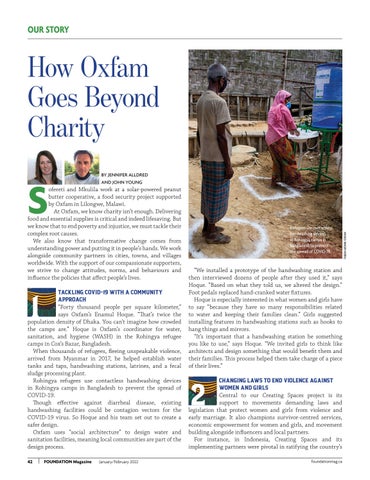OUR STORY
How Oxfam Goes Beyond Charity ofereti and Mkulila work at a solar-powered peanut butter cooperative, a food security project supported by Oxfam in Lilongwe, Malawi. At Oxfam, we know charity isn’t enough. Delivering food and essential supplies is critical and indeed lifesaving. But we know that to end poverty and injustice, we must tackle their complex root causes. We also know that transformative change comes from understanding power and putting it in people’s hands. We work alongside community partners in cities, towns, and villages worldwide. With the support of our compassionate supporters, we strive to change attitudes, norms, and behaviours and influence the policies that affect people’s lives. TACKLING COVID-19 WITH A COMMUNITY APPROACH “Forty thousand people per square kilometer,” says Oxfam’s Enamul Hoque. “That’s twice the population density of Dhaka. You can’t imagine how crowded the camps are.” Hoque is Oxfam’s coordinator for water, sanitation, and hygiene (WASH) in the Rohingya refugee camps in Cox’s Bazar, Bangladesh. When thousands of refugees, fleeing unspeakable violence, arrived from Myanmar in 2017, he helped establish water tanks and taps, handwashing stations, latrines, and a fecal sludge processing plant. Rohingya refugees use contactless handwashing devices in Rohingya camps in Bangladesh to prevent the spread of COVID-19. Though effective against diarrheal disease, existing handwashing facilities could be contagion vectors for the COVID-19 virus. So Hoque and his team set out to create a safer design. Oxfam uses “social architecture” to design water and sanitation facilities, meaning local communities are part of the design process.
1
42
FOUNDATION Magazine
January/February 2022
Refugees use contactless handwashing devices in Rohingya camps in Bangladesh to prevent the spread of COVID-19.
“We installed a prototype of the handwashing station and then interviewed dozens of people after they used it,” says Hoque. “Based on what they told us, we altered the design.” Foot pedals replaced hand-cranked water fixtures. Hoque is especially interested in what women and girls have to say “because they have so many responsibilities related to water and keeping their families clean.” Girls suggested installing features in handwashing stations such as hooks to hang things and mirrors. “It’s important that a handwashing station be something you like to use,” says Hoque. “We invited girls to think like architects and design something that would benefit them and their families. This process helped them take charge of a piece of their lives.” CHANGING LAWS TO END VIOLENCE AGAINST WOMEN AND GIRLS Central to our Creating Spaces project is its support to movements demanding laws and legislation that protect women and girls from violence and early marriage. It also champions survivor-centred services, economic empowerment for women and girls, and movement building alongside influencers and local partners. For instance, in Indonesia, Creating Spaces and its implementing partners were pivotal in ratifying the country’s
2
foundationmag.ca
FABEHA MONIR/OXFAM
S
BY JENNIFER ALLDRED AND JOHN YOUNG











